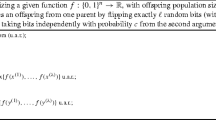Abstract
Geiringer’s theorem is a statement which tells us something about the limiting frequency of occurrence of a certain individual when a classical genetic algorithm is executed in the absence of selection and mutation. Recently Poli, Stephens, Wright and Rowe extended the original theorem of Geiringer to include the case of variable length genetic algorithms and linear genetic programming. In the current paper a rather powerful version of Geiringer’s theorem which has been established recently by Mitavskiy is used to derive a schema-based version of the theorem for nonlinear genetic programming with homologous crossover.
Preview
Unable to display preview. Download preview PDF.
Similar content being viewed by others
References
Booker, L.: Recombination distributions for genetic algorithms. In: Darrell Whitley, L. (ed.) Foundations of Genetic Algorithms 2, pp. 29–44. Morgan Kaufmann, San Francisco (1993)
Coffey, S.: An Applied Probabilist’s Guide to Genetic Algorithms. A Thesis Submitted to The University of Dublin for the degree of Master in Science (1999)
Geiringer, H.: On the probability of linkage in Mendelian heredity. Annals of Mathematical Statistics 15, 25–57 (1944)
Mitavskiy, B.: Crossover Invariant Subsets of the Search Space for Evolutionary Algorithms. Evolutionary Computation 12(1), 19–46 (2004)
Mitavskiy, B.: Comparing Evolutionary Computation Techniques via Their Representation. In: Cantú-Paz, E., et al. (eds.) Proceedings of the Genetic and Evolutionary Computation (GECCO) Conference, vol. 1, pp. 1196–1209. Springer, Heidelberg (2003)
Mitavskiy, B.: A Generalization of Geiringer Theorem for a wide class of evolutionary search algorithms. Evolutionary Computation (recently submitted), http://www.math.lsa.umich.edu/_bmitavsk/
Poli, R.: Hyperschema Theory for GP with One-Point Crossover, Building Blocks, and Some New Results in GA Theory. In: Poli, R., Banzhaf, W., Langdon, W.B., Miller, J., Nordin, P., Fogarty, T.C., et al. (eds.) EuroGP 2000. LNCS, vol. 1802, pp. 163–180. Springer, Heidelberg (2000)
Poli, R., Langdon, W.: On the search Properties of Different Crossover Operators in Genetic Programming (1998)
Poli, R., Stephens, C., Wright, A., Rowe, J.: A Schema-Theory-Based Extension of Geiringer’s Theorem for Linear GP and variable-length GAs under Homologous Crossover. FOGA 2002 (2002)
Rabani, Y., Rabinovich, Y., Sinclair, A.: A Computational View of Population Genetics. In: Annual ACM Symposium on the Theory of Computing, pp. 83–92 (1995)
Rosenthal, J.: Convergence Rates for Markov Chains. SIAM Review 37(3), 387–405 (1995)
Rowe, J., Vose, M., Wright, A.: Group properties of crossover and mutation. Evolutionary Computation 10(2), 151–184 (2002)
Rowe, J., Vose, M., Wright, A.: Structural Search Spaces and Genetic Operators. Evolutionary Computation (to appear)
Schmitt, L.: Theory of Genetic Algorithms. Theoretical Computer Science 259, 1–61 (2001)
Schmitt, L.: Theory of Genetic Algorithms II: Models for Genetic Operators over the String-Tensor representation of Populations and Convergence to Global Optima for Arbitrary Fitness Function under Scaling. Theoretical Computer Science 310, 181–231 (2004)
Spears, W.: The Equilibrium and Transient Behavior of Mutation and Recombination. Foundations of Genetic Algorithms 6, FOGA-6 (2000)
Vose, M.: The simple genetic algorithm: foundations and theory. MIT Press, Cambridge (1999)
Author information
Authors and Affiliations
Editor information
Editors and Affiliations
Rights and permissions
Copyright information
© 2005 Springer-Verlag Berlin Heidelberg
About this paper
Cite this paper
Mitavskiy, B., Rowe, J.E. (2005). A Schema-Based Version of Geiringer’s Theorem for Nonlinear Genetic Programming with Homologous Crossover. In: Wright, A.H., Vose, M.D., De Jong, K.A., Schmitt, L.M. (eds) Foundations of Genetic Algorithms. FOGA 2005. Lecture Notes in Computer Science, vol 3469. Springer, Berlin, Heidelberg. https://doi.org/10.1007/11513575_9
Download citation
DOI: https://doi.org/10.1007/11513575_9
Publisher Name: Springer, Berlin, Heidelberg
Print ISBN: 978-3-540-27237-3
Online ISBN: 978-3-540-32035-7
eBook Packages: Computer ScienceComputer Science (R0)




